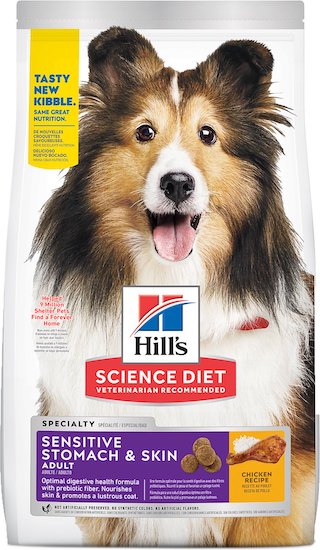- This post contains affiliate links. Read more here.
- Not a substitute for professional veterinary help.
When your dog has stomach issues, you want to do everything you can to make sure they’re comfortable—and a huge part of that is making sure they have the right dog food for sensitive stomachs.
But what does that mean? We asked Dr. Jamie Richardson, chief of staff at Small Door Veterinary, to help us get to the bottom of that and explain what ingredients you should be on the lookout for. We also list some of the best dog foods on the market with those ingredients for pups who struggle with a sensitive tummy.
What Are Some of the Main Causes of a Sensitive Stomach in Dogs?
Before we jump into what ingredients to look for in food for dogs with sensitive stomachs (and some of the best options on the market), let’s cover the different reasons your dog might be struggling with a sensitive tummy in the first place.
Sudden changes in diet can cause serious stomach issues with dogs; so, for example, if you run out of your typical brand of food and substitute another, it could cause your dog’s digestive system to go a little haywire. “The sudden change of fat content or protein type of going from one food to another can upset a dog’s gastrointestinal system,” says Richardson.
But if you can’t tie it back to a change in diet—or if your dog’s sensitive stomach is chronic—it could be a sign of a more pressing health issue such as inflammatory bowel disease (IBD), pancreatitis, or food allergies, Richardson says. Check with your veterinarian to find out what’s going on.
What Are the Best Ingredients for a Dog with a Sensitive Stomach?
If your dog has a sensitive stomach, look for foods with bland ingredients.
“Depending on the underlying cause of a sensitive stomach, we generally recommend bland, easily digestible protein and carbohydrate sources like chicken, turkey breast, boneless white fish, rice, pasta, whole grains, and prebiotics (fiber) to help large intestinal health and support healthy gut flora,” Richardson says.
Adding probiotics to the mix may also help calm your dog’s stomach issues. “Supplementing your dog’s diet with a high-quality probiotic can help many dogs with sensitive stomachs.”
Is Dog Food Formulated for a Sensitive Stomach Healthy?
If your dog has stomach problems, moving them to a diet of food specifically formulated for sensitive stomachs can help get their tummy issues under control.
“Those dogs that have demonstrated gastrointestinal signs or recurring gastrointestinal signs can benefit from dog food formulated for sensitive stomachs,” says Richardson.
Just keep in mind that if your dog has more severe GI issues, they might need a vet-prescribed diet to feel their best. This is especially important if your dog’s sensitive stomach issues are a result of allergies.
“An important distinction exists between dogs with a sensitive stomach and those with true food allergies,” Richardson says. “Those with food allergies require a specially formulated diet that is either completely hypoallergenic or what we call a ‘novel’ protein source, such as duck or rabbit, that the dog’s immune system does not react to. Over-the-counter diets that claim to be ‘hypoallergenic’ or ‘novel protein’ do not have the same quality control as veterinary prescription diets where there is absolutely no cross-contamination during the manufacturing of the diets.”
The Best Dog Food for a Sensitive Stomach
Based on what we’ve learned from Richardson, and our own research, here are our picks for the best dog food for sensitive stomachs—including a few foods your vet may prescribe.
Make sure you consult your vet before you introduce any new foods into your dog’s diet. Your veterinarian can help you understand why your dog is struggling with stomach issues—and can recommend the dog food that’s going to best support their health.
Formulated with a host of ingredients to support digestive health, including a proprietary strain of probiotics and a blend of soluble and insoluble fibers from nutrient-dense foods like chia seeds and coconut, this dry food from Diamond Naturals also contains a variety of superfoods such as salmon, kale, pumpkin, and blueberries that pack a healthy punch.
Hill’s has a reputation as being a go-to for dogs with stomach issues. And the sensitive stomach and skin formula, which is made with easy-to-digest ingredients like chicken, rice, barley, and prebiotic fiber, is one of the brand’s most popular.
The fewer the ingredients in your dog food, the fewer opportunities there are for your dog’s tummy to react to a particular ingredient. Blue Buffalo Basics Limited Ingredient Diet is formulated with ingredients to support gentle digestion, such as pumpkin, and is also full of additional nutrients to support your dog’s health, including omega-3 and -6 fatty acids to promote skin and coat health.
This grain-free formulation is not only packed with essential nutrients for your pup (including antioxidants and omega-3 and -6 fatty acids), but it’s also formulated with easily digestible proteins and a fiber blend to support digestive health.
Packed with healthy, easy-to-digest whole foods (including salmon, which is the first ingredient), this sensitive stomach fish-based formulation is a solid choice (pun intended!) for people looking for grain- and gluten-free dog food that supports digestive health.
Salmon is the first ingredient in this protein-rich, highly-digestible recipe. It includes prebiotic fiber that supports the beneficial bacteria found in your dog’s intestine. Rice and oatmeal to provide easily digestible sources of carbohydrates.
Veterinary Prescription Foods for a Sensitive Stomach
If your dog’s gastro-intestinal issues persist, talk with your vet. They may suggest a special limited-ingredient diet (LID) in case your dog’s issues are caused by a common protein or carbohydrate. They also may suggest a prescription-only food (also called a veterinary diet) with highly digestible ingredients, such as Hill’s Prescription Diet foods or Royal Canin Veterinary Diet foods.
Further Reading
Featured image by JC Gellidon/Unsplash







